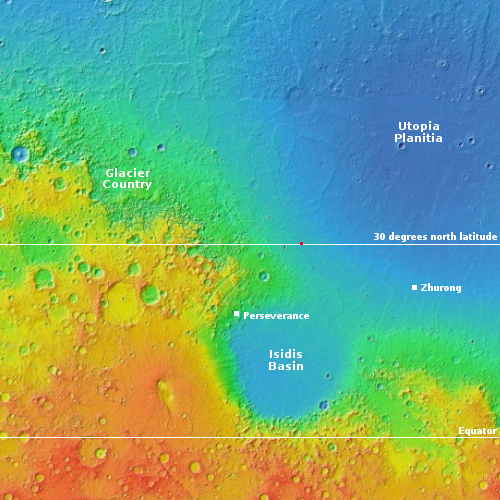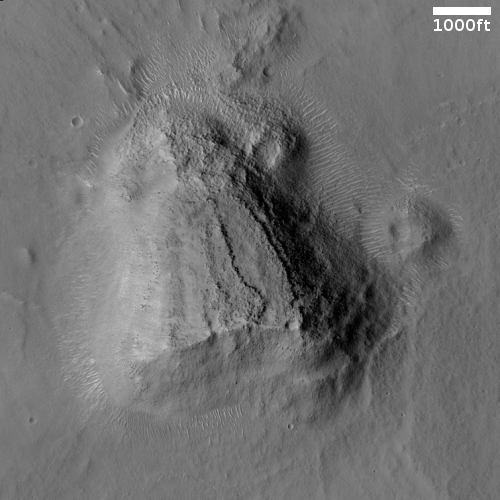Mesa in the Martian northern lowlands
Cool image time! The photo to the right, cropped and reduced to post here, was taken on February 2, 2022 by the high resolution camera on Mars Reconnaissance Orbiter (MRO) and shows a mesa sticking up on the relatively flat and featureless northern lowland plains in Utopia Planitia, the second largest impact basin on Mars.
The full image shows three such mesas. Though pictures taken in the northern lowlands of Utopia tend to show evidence of buried ice or glaciers, the impression I get from this picture is one of dryness. If there is any ice here, it is below ground. And even that seems unlikely. The surface surrounding nearby craters does not have that squishy and slushy look that is seen in the north when an impact occurred on near surface ice. Instead, the ground looks solid.
The overview map below reinforces this impression.

The red dot on the 30th parallel north of Isidis Basin marks the location of this mesa. At that latitude the mesa is at the very southern edge of the 30-60 degree mid-latitude bands where scientists have found many Martian glaciers. While a few spots south of that latitude have been identified where there might be ice, they are few and also uncertain. The general trend is dryness once one gets to 30 degrees.
These mesas are intriguing because they suggest that the surface here was once higher, and that a significant amount of material has been removed over the eons, with these mesas somehow surviving. This hypothesis is strengthened by what look like two pedestal craters just to the east of the mesa. Pedestal craters are thought to be impact spots that resist erosion because the impact smashes the material at the site and makes it more resistant to erosion. When the surrounding terrain erodes away, the crater remains.
What swept those top layers away? A first guess is that once there was underground ice here, and with its slow loss over time the surface dropped away.
On Christmas Eve 1968 three Americans became the first humans to visit another world. What they did to celebrate was unexpected and profound, and will be remembered throughout all human history. Genesis: the Story of Apollo 8, Robert Zimmerman's classic history of humanity's first journey to another world, tells that story, and it is now available as both an ebook and an audiobook, both with a foreword by Valerie Anders and a new introduction by Robert Zimmerman.
The print edition can be purchased at Amazon or from any other book seller. If you want an autographed copy the price is $60 for the hardback and $45 for the paperback, plus $8 shipping for each. Go here for purchasing details. The ebook is available everywhere for $5.99 (before discount) at amazon, or direct from my ebook publisher, ebookit. If you buy it from ebookit you don't support the big tech companies and the author gets a bigger cut much sooner.
The audiobook is also available at all these vendors, and is also free with a 30-day trial membership to Audible.
"Not simply about one mission, [Genesis] is also the history of America's quest for the moon... Zimmerman has done a masterful job of tying disparate events together into a solid account of one of America's greatest human triumphs."--San Antonio Express-News
Cool image time! The photo to the right, cropped and reduced to post here, was taken on February 2, 2022 by the high resolution camera on Mars Reconnaissance Orbiter (MRO) and shows a mesa sticking up on the relatively flat and featureless northern lowland plains in Utopia Planitia, the second largest impact basin on Mars.
The full image shows three such mesas. Though pictures taken in the northern lowlands of Utopia tend to show evidence of buried ice or glaciers, the impression I get from this picture is one of dryness. If there is any ice here, it is below ground. And even that seems unlikely. The surface surrounding nearby craters does not have that squishy and slushy look that is seen in the north when an impact occurred on near surface ice. Instead, the ground looks solid.
The overview map below reinforces this impression.

The red dot on the 30th parallel north of Isidis Basin marks the location of this mesa. At that latitude the mesa is at the very southern edge of the 30-60 degree mid-latitude bands where scientists have found many Martian glaciers. While a few spots south of that latitude have been identified where there might be ice, they are few and also uncertain. The general trend is dryness once one gets to 30 degrees.
These mesas are intriguing because they suggest that the surface here was once higher, and that a significant amount of material has been removed over the eons, with these mesas somehow surviving. This hypothesis is strengthened by what look like two pedestal craters just to the east of the mesa. Pedestal craters are thought to be impact spots that resist erosion because the impact smashes the material at the site and makes it more resistant to erosion. When the surrounding terrain erodes away, the crater remains.
What swept those top layers away? A first guess is that once there was underground ice here, and with its slow loss over time the surface dropped away.
On Christmas Eve 1968 three Americans became the first humans to visit another world. What they did to celebrate was unexpected and profound, and will be remembered throughout all human history. Genesis: the Story of Apollo 8, Robert Zimmerman's classic history of humanity's first journey to another world, tells that story, and it is now available as both an ebook and an audiobook, both with a foreword by Valerie Anders and a new introduction by Robert Zimmerman.
The print edition can be purchased at Amazon or from any other book seller. If you want an autographed copy the price is $60 for the hardback and $45 for the paperback, plus $8 shipping for each. Go here for purchasing details. The ebook is available everywhere for $5.99 (before discount) at amazon, or direct from my ebook publisher, ebookit. If you buy it from ebookit you don't support the big tech companies and the author gets a bigger cut much sooner.
The audiobook is also available at all these vendors, and is also free with a 30-day trial membership to Audible.
"Not simply about one mission, [Genesis] is also the history of America's quest for the moon... Zimmerman has done a masterful job of tying disparate events together into a solid account of one of America's greatest human triumphs."--San Antonio Express-News


